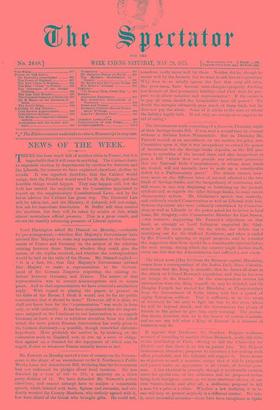The Government made something of a fiasco on Thursday night
of their Savings-banks Bill. It was read a second time by consent without a division before Whitsuntide. But on Thursday Mr. Fawcett moved, as an amendment on the motion for going into Committee upon it, that it was inexpedient to extend the power of investment for the Savings-banks deposits, as the Bill pro- poses, to securities of the second class, and also inexpedient to pass a Bill "which does not provide any adequate guarantee that the National Debt Commissioners, in whom these funds are vested, will not annually have to make up a considerable deficit by a Parliamentary grant." The debate turned, how- ever, more on the different rates of interest allowed to the two kinds of Savings-banks, and the inexpediency of continuing and, still worse, in any way disguising or bolstering-up the present artificial and, as regards the older Savings-banks, to some extent eleemosynary system. Mr. Gladstone's speech was masterly, and evidently carried Conservatives as well as Liberals with bins. Serious objections also were evidently entertained by Conserva- tives as well as Liberals to the power asked for to invest in local loans, Mr. Gregory,—the Conservative Member for East Sussex, —for instance, supporting Mr. Fawcett's objections on that head, as strongly as Lord Eslington supported Mr. Glad- stone's on the main point. On the whole, the debate was a mortifying one for Sir Stafford Northcote, and when it ended by Mr. Disraeli's agreeing to report progress, and to consider the suggestion that there should be a considerable interval before the next sitting, during which the country might declare itself, every one felt that the Administration had suffered a new check.


































